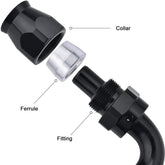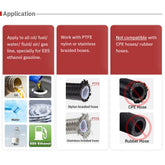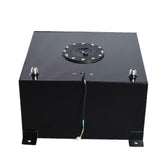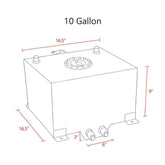Leaks in the cylinder head gasket (commonly known as "head gasket blowing") can cause coolant, combustion gases, or both to leak.
The leakage of the cylinder head gasket is divided into external leakage and internal leakage. External leaks are visible, such as oil or coolant on the outside (usually underneath) of the engine. An internal leak is when fluid gets into another circuit and can cause a change in the coolant or oil. The former may be foam (caused by hydrocarbons) in the coolant expansion tank. Coolant leaks into the oil system can result in a mayonnaise or milkshake-like substance in the oil that can often be seen on the dipstick or on the oil filler cap. However, the presence of this substance is not conclusive evidence of cylinder head gasket failure, as oil can mix with the coolant through other means. Also, it is entirely possible for the cylinder head gasket to fail, causing the oil to never come in contact with the coolant. Therefore, the condition of the cylinder head gasket cannot be determined conclusively by checking the oil.
The most common cause of cracked or damaged cylinder head gaskets is usually an engine overheating. A high engine temperature is usually caused by a lack of coolant (usually a leak) in the radiator. Depending on the material, some gaskets may wear faster than others. For example, aluminum expands faster when heated. Metals with a higher rate of thermal expansion are more sensitive to heat. Higher temperatures can cause objects to change shape, which can have unfavorable results. The expansion of the cylinder head due to heat can weaken its integrity and prevent the cylinder head gasket from sealing properly.
When a cylinder head gasket burns, it is important to address the problem immediately. Continuing to use a vehicle with a damaged gasket will cause serious and irreparable damage to the engine. Because the gasket acts as a seal, maintaining pressure is key to engine power. Once the gasket burns out, it can no longer seal and will release pressure, significantly reducing engine power. This is one of the few signs that a cylinder head gasket has cracked. Also, the oil and coolant passages may start to leak into areas that shouldn't. As the coolant enters the combustion chamber, it mixes and dilutes the engine oil. It can also reduce the cooling capacity of the cooling system, which can cause the engine to overheat.
Engine knock is another cause of cylinder head gasket failure as it can damage armor or fire rings, causing cylinder pressure to leak through the armor. Engine knock can be caused by poor quality fuel, engine malfunction, or attempting to select inappropriate fuel and/or ignition settings during engine tuning. If the knocking is severe, the cylinder pressure can increase to more than 8 times the normal pressure, which can cause the cylinder head to lift from the engine block and break the seal between the two. Most gaskets used in standard production engines will be severely damaged by severe explosions.
The leakage of the cylinder head gasket is divided into external leakage and internal leakage. External leaks are visible, such as oil or coolant on the outside (usually underneath) of the engine. An internal leak is when fluid gets into another circuit and can cause a change in the coolant or oil. The former may be foam (caused by hydrocarbons) in the coolant expansion tank. Coolant leaks into the oil system can result in a mayonnaise or milkshake-like substance in the oil that can often be seen on the dipstick or on the oil filler cap. However, the presence of this substance is not conclusive evidence of cylinder head gasket failure, as oil can mix with the coolant through other means. Also, it is entirely possible for the cylinder head gasket to fail, causing the oil to never come in contact with the coolant. Therefore, the condition of the cylinder head gasket cannot be determined conclusively by checking the oil.
The most common cause of cracked or damaged cylinder head gaskets is usually an engine overheating. A high engine temperature is usually caused by a lack of coolant (usually a leak) in the radiator. Depending on the material, some gaskets may wear faster than others. For example, aluminum expands faster when heated. Metals with a higher rate of thermal expansion are more sensitive to heat. Higher temperatures can cause objects to change shape, which can have unfavorable results. The expansion of the cylinder head due to heat can weaken its integrity and prevent the cylinder head gasket from sealing properly.
When a cylinder head gasket burns, it is important to address the problem immediately. Continuing to use a vehicle with a damaged gasket will cause serious and irreparable damage to the engine. Because the gasket acts as a seal, maintaining pressure is key to engine power. Once the gasket burns out, it can no longer seal and will release pressure, significantly reducing engine power. This is one of the few signs that a cylinder head gasket has cracked. Also, the oil and coolant passages may start to leak into areas that shouldn't. As the coolant enters the combustion chamber, it mixes and dilutes the engine oil. It can also reduce the cooling capacity of the cooling system, which can cause the engine to overheat.
Engine knock is another cause of cylinder head gasket failure as it can damage armor or fire rings, causing cylinder pressure to leak through the armor. Engine knock can be caused by poor quality fuel, engine malfunction, or attempting to select inappropriate fuel and/or ignition settings during engine tuning. If the knocking is severe, the cylinder pressure can increase to more than 8 times the normal pressure, which can cause the cylinder head to lift from the engine block and break the seal between the two. Most gaskets used in standard production engines will be severely damaged by severe explosions.









